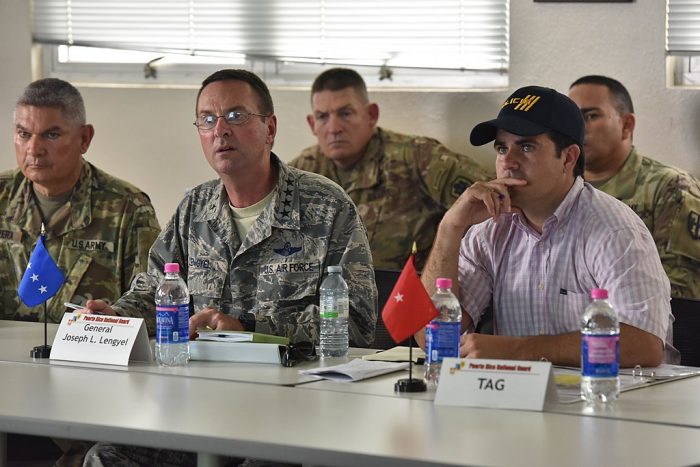

Air Force Gen. Joseph Lengyel, chief, National Guard Bureau, Army Command Sgt. Maj. Christopher Kepner, senior enlisted advisor to the chief, National Guard Bureau, visit Puerto Rico National Guard members assisting with Hurricane Maria relief efforts in Puerto Rico, Sept. 27, 2017. (U.S. Army National Guard photo by Staff Sgt. Michelle Gonzalez/ Creative Commons Attribution 2.0 Generic)
SAN JUAN, PUERTO RICO — Yes, when Donald Trump arrives Tuesday to Puerto Rico on Air Force One, he will be the fifth siting president to visit the island since 1898, when American troops invaded through the town of Guánica, a southwestern town of the island, in the final days of the Spanish-Cuban-American War. The last time a President was in Puerto Rico? When President Barack Obama decided to hold a fundraiser in Puerto Rico six years ago and give a tacit approval of then-candidate for governor Alejandro García Padilla.
Trump’s Tuesday visit will happen after a week where national press and local government opposition leaders criticized his response to the crisis of the aftermath of Hurricane Maria. He has even argued that even though Maria has indeed devastated the island’s economy for years to come, after a decade of recession affecting the island, it must still pay its debt.
In a certain way, María could be a political godsend for Puerto Rico. The attention of the entire United States press, and of our fellow Americans, to the federal government’s response to Maria had laid bare the colonial status of Puerto Rico (and the U.S. Virgin Islands).
Sunday morning in a press conference, governor Ricardo Rosselló Nevares made a subtle case that because of the colonial status of Puerto Rico, the level of preparedness in terms of funding was not the same as the 50 states of the Union. With only a third of federal funding received for many programs, the local government’s resources to address the current crisis is subpar. And honestly, Rosselló is correct in his analysis. He has done everything that he can to make the case that Puerto Rico needs all the help it can get.
Puerto Rican Gov. Ricardo Rosselló: “We are US citizens, but more importantly we are all equal as human beings.” https://t.co/ktnTZYSyz0 pic.twitter.com/qQbg5hAV1r
— ABC News (@ABC) October 2, 2017
Even the mayor of San Juan, Carmen Yulín Cruz, a potential rival to Rosselló in the 2020 gubernatorial elections, made the claim last Frdiay that FEMA had reached it’s logistical and practical limits. She was highly critical of the Trump administration’s doublespeak.
Even award winning and controversial left-leaning filmmaker Michael Moore understands that the island’s status is that partly to blame for the slow reaction to Puerto Rico’s emergency by the federal government. He urged Monday, via his twitter account, that Congress validate the wishes of 60% of the population, in reference to 2012 statehood vote, and begin the process after the emergency is over.
10. When this immediate crisis is over, Congress must respect the wishes of over 60% of the Puerto Rican people & make PR a state. DC too!
— Michael Moore (@MMFlint) October 1, 2017
Even though the federal government’s response has been lacking, state governments, both Republican and Democrats, have stepped up to come to the aid of 3.5 million Americans who reside in Puerto Rico. The crisis has also helped emphasize that Puerto Ricans are Americans, and in a way, it has closed the divide between American citizens on the mainland and American citizens in the Caribbean.
The irony of it all?
Unwillingly, Donald J. Trump will become one of the presidents who, whether by choice or pressure, will be remembered for helping Puerto Rico. Hopefully this “awakening” will help put pressure on Congress to address the territorial status of Puerto Rico and the USVI. Maybe, just maybe, this catastrophe will shine light into the end of the tunnel of America’s unfinished colonial business.
***
Edwin Jusino tweets from @erjusinoa.


